MercoPress. South Atlantic News Agency
Tag: Inflation
-
Wednesday, March 16th 2011 - 05:10 UTC
February inflation in Argentina, 0.7%; private estimates double that percentage
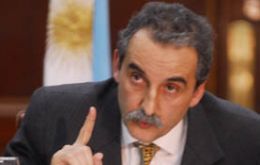
Inflation in Argentina advanced 0.7% in February over the previous month pushed mainly by increases in the clothing sector (2.2%) and leisure activities (3.5%), according to the official Indec National Statistics Bureau. During the first two months of the year, the consumer prices index accumulated 1.5%.
-
Tuesday, March 15th 2011 - 05:32 UTC
Corruption and inflation, main challenges to social stability admits China
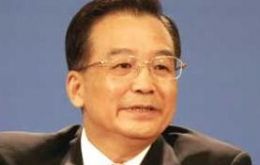
Premier Wen Jiabao said on Monday China would pursue political reforms only in a “gradual” manner and within the umbrella of one-party rule, even as he ruled out the likelihood of the recent West Asian uprisings having any impact on China.
-
Thursday, March 10th 2011 - 20:16 UTC
Brazilian markets expect further tightening to bring inflation to target

Brazil's central bank said Thursday it remained cautious about the outlook for prices due to uncertainties in the global economy, and hinted that more than just interest rates may be needed to bring inflation back into line with targets.
-
Saturday, March 5th 2011 - 06:55 UTC
Chinese congress targets social stability; admits inflation and corruption

China must ensure social stability by reducing inflation and corruption, Premier Wen Jiabao has told the parliament's annual session. Mr Wen has been addressing about 3,000 delegates to open the National People's Congress in the Great Hall of the People in Beijing.
-
Tuesday, March 1st 2011 - 00:07 UTC
China lowers annual economic growth target from 7.5% to 7%

China's Prime Minister Wen Jiabao says China is lowering its annual economic growth target from 7.5% to 7% and is determined to contain soaring prices. He was speaking in a question and answer session with internet users in what has become an annual online chat. Mr Wen said China needed to ensure that growth was sustainable.
-
Monday, February 28th 2011 - 06:50 UTC
Mercosur central bankers warn task ahead has become “more complicated”

Mercosur central banks’ presidents meeting in Peru last Friday agreed that the task ahead has become ‘more complicated’ because of growing inflationary pressures triggered by soaring food and oil prices.
-
Monday, February 28th 2011 - 06:32 UTC
Inflation challenges Brazil; tighter monetary measures anticipated
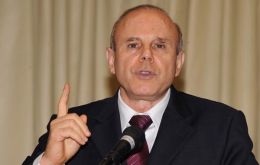
Brazil's general price index, or IGP-M, rose 1% month-on-month in February, compared to 0.79% rise in January, the Getulio Vargas Foundation said Friday. Economists' had forecast the index to rise 1.01%.
-
Wednesday, February 16th 2011 - 22:34 UTC
Trichet blames Euro-zone inflation spike on emerging economies rapid recovery
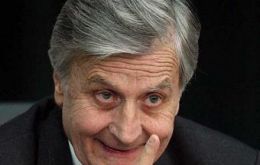
The European Central Bank is not surrendering its price stability objective for crisis management policy, the bank's President Jean-Claude Trichet said. He also argued that the recent spike in Euro zone inflation is due to the current rapid economic recovery in emerging markets and not due to the currency bloc's sovereign debt crisis.
-
Monday, February 14th 2011 - 23:47 UTC
Roubini warns of “hard landing” if developing countries don’t control inflation

Nouriel Roubini the New York University professor, who predicted the credit crisis, said China and other emerging markets risk a “hard landing” as they start raising interest rates to fight inflation.
-
Monday, February 14th 2011 - 03:36 UTC
Argentines accept inflation is in the range of 25%, but divided on the causes
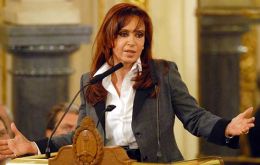
A majority of Argentines, 74%, believes that inflation is harming their finances and a similar percentage, 74%, considers the administration of President Cristina Fernandez de Kirchner is hardly interested in the issue, according to a public opinion poll published Sunday in Buenos Aires La Nacion.
